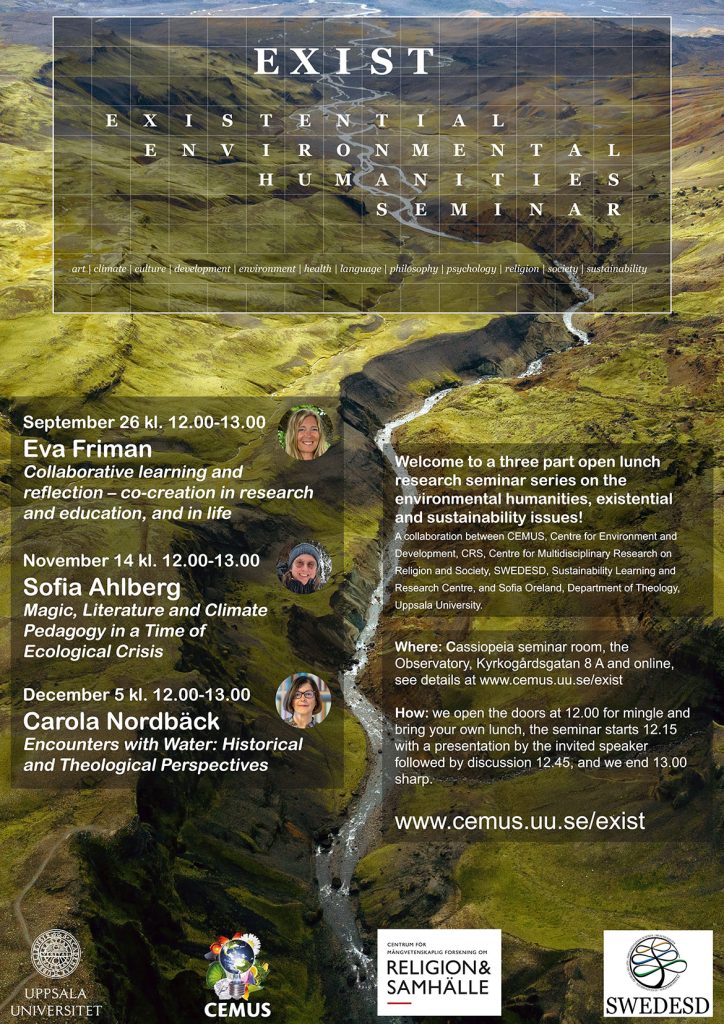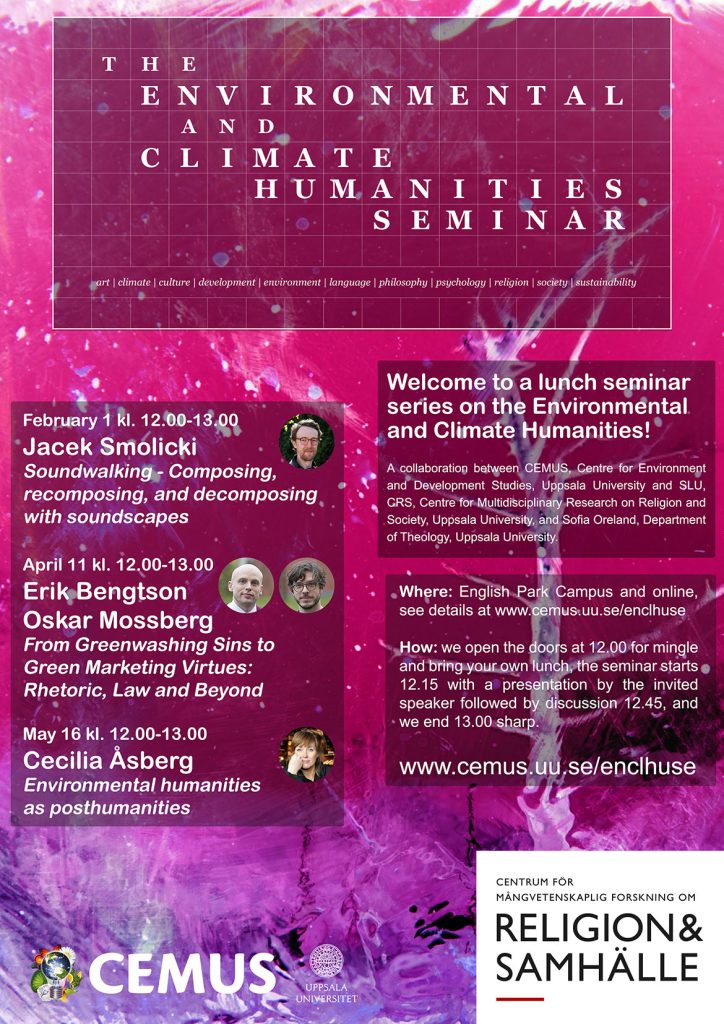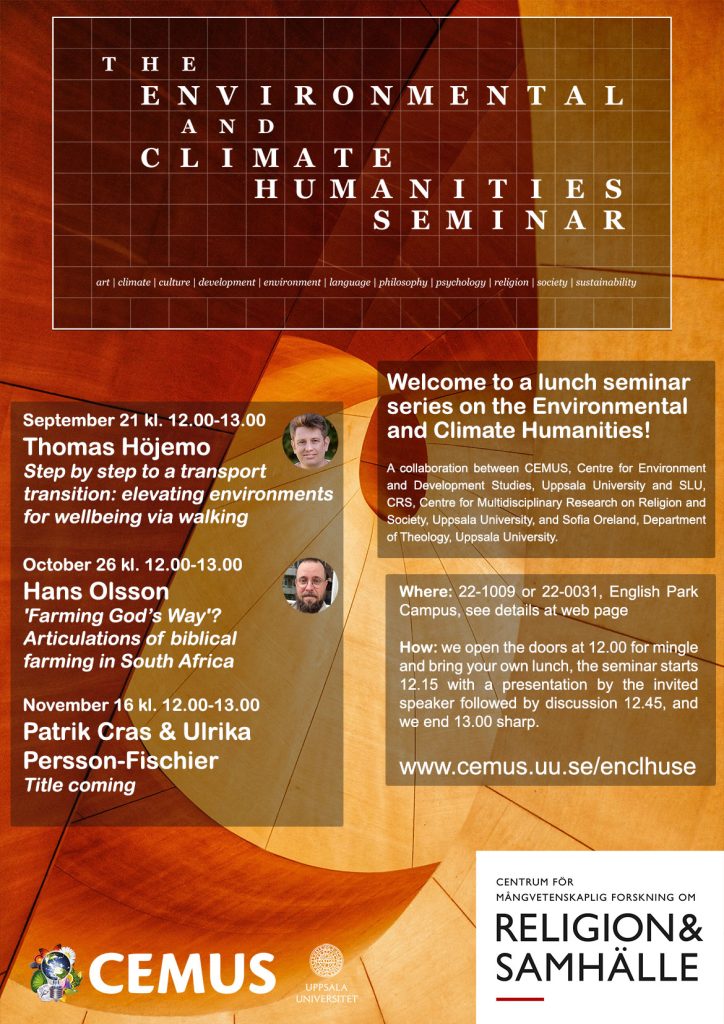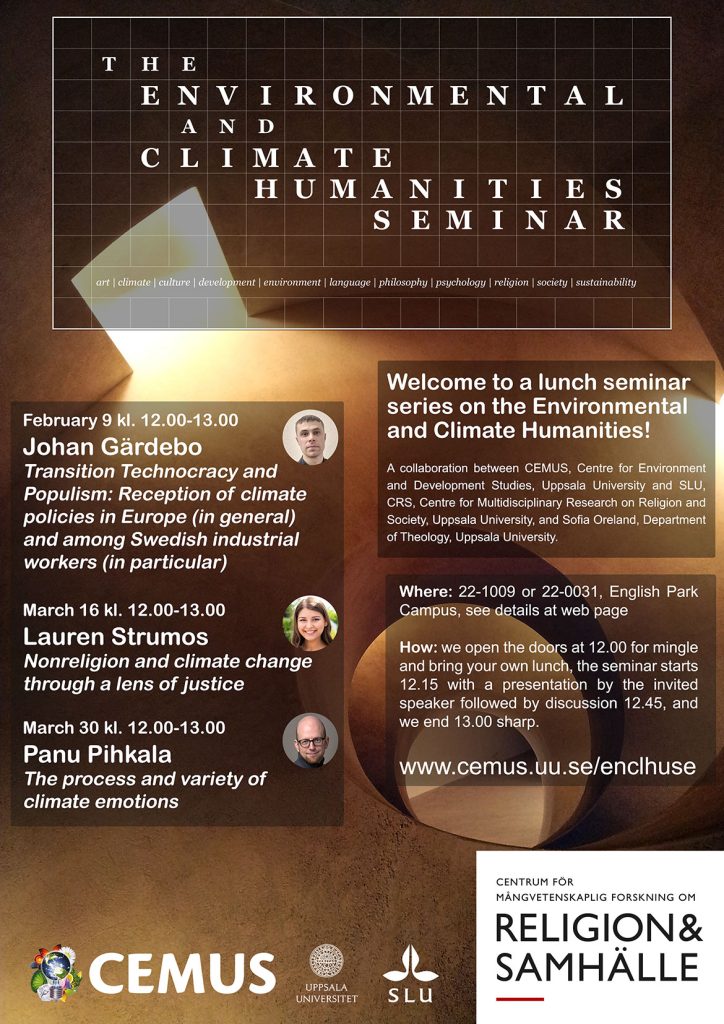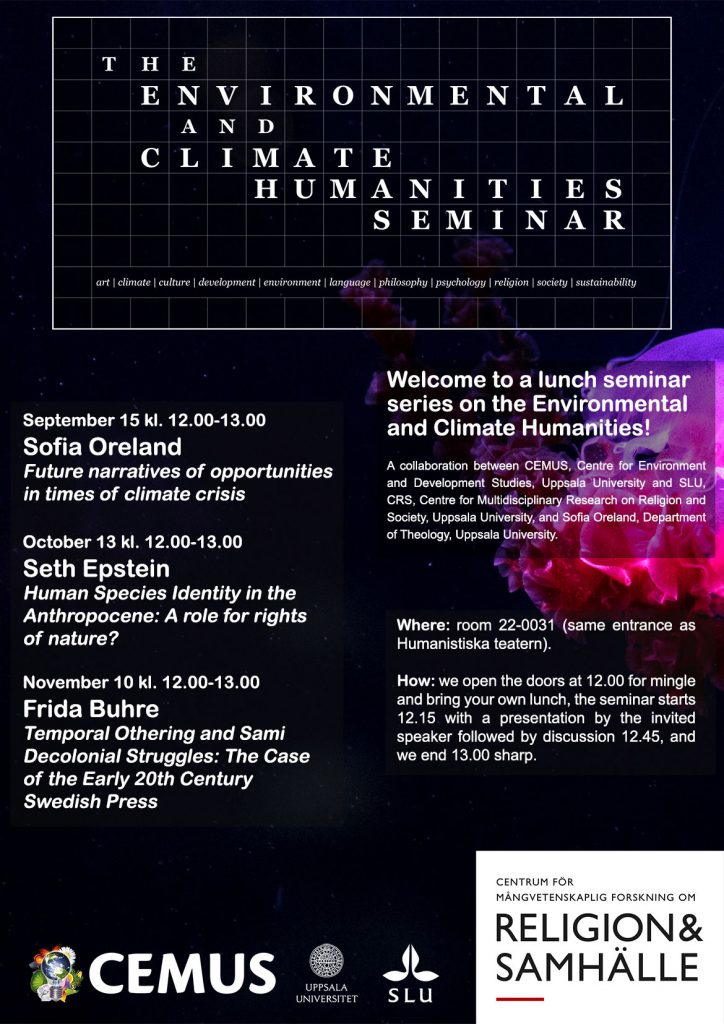Autumn semester 2024
Welcome to a three part open lunch research seminar series on the environmental humanities, existential and sustainability issues! This autumn 2024, starting September 26!
When: September 26, November 14 and December 5 kl. 12.00-13.00
Where: Cassiopeia seminar room, the Observatory, Kyrkogårdsgatan 8 A, 753 12 Uppsala, see map here: https://link.mazemap.com/4eZNcqYf
Online: https://uu-se.zoom.us/j/66201001474
How: We open the doors at 12.00 for mingle and bring your own lunch, the seminar starts 12.15 with a presentation by the invited speaker followed by discussion 12.45, and we end 13.00 sharp.
September 26 kl. 12.00-13.00
Eva Friman Collaborative learning and reflection – co-creation in research and education, and in life
Moderated by SWEDESD
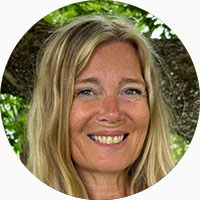
Bio
Eva Friman is an intellectual historian and ecological economist, with an interest in theory of science, discourses, the power of language, and ecological economic theory development. I am engaged in transdisciplinary sustainability studies with the long-term objective of ecological sustainability and global equity. Since recently, I’m also devoting myself to transformative learning and global health. Current positions: Researcher, Program director and Adjunct Professor.
Read more: https://www.uu.se/en/contact-and-organisation/staff?query=N5-338
December 5 kl. 12.00-13.00
Carola Nordbäck Encounters with Water: Historical and Theological Perspectives
Moderated by Martha Middlemiss Lé Mon, CRS
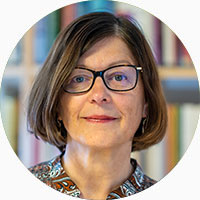
Bio
Carola Nordbäck is a researcher at the Research and Analysis Unit of the Church of Sweden, and an affiliated professor of Church History in the field of Museology at Umeå University. Her research focuses on environmental humanities and eco-theology.
Nordbäck’s ongoing research focuses on the question of the church’s role and challenges in a time of ecological crisis. She has taken a particular interest in the relationship between humans and water, highlighting blue theology as a way to deepen the understanding of humanity’s existential relationship with water. In her lecture, Nordbäck will combine a historical and contemporary perspective and discuss the following questions: How has the church’s existential and theological meaning-making regarding water changed over time? What can historical reflections tell us about both the past and our present time?
Read more: https://www.svenskakyrkan.se/forskning/carola-nordback-forskare
Spring semester 2024
Welcome to a three part lunch seminar series on the Environmental and Climate Humanities this spring 2024, starting February 1!
When: February 1, April 11 and May 16 kl. 12.00-13.00
Where: room 22-0031, see map here: https://link.mazemap.com/k1hn0pOx (same entrance as Humanistiska teatern), English Park Campus
Online: https://uu-se.zoom.us/j/66201001474
How: We open the doors at 12.00 for mingle and bring your own lunch, the seminar starts 12.15 with a presentation by the invited speaker followed by discussion 12.45, and we end 13.00 sharp.
February 1 kl. 12.00-13.00
Jacek Smolicki Soundwalking – Composing, recomposing, and decomposing with soundscapes
Moderated by Malin Östman, CEMUS
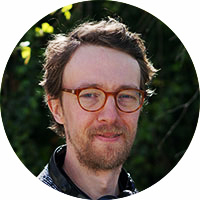
Bio
Jacek Smolicki is an interdisciplinary artist, researcher, designer and educator. His work brings historical, critical and existential dimensions to listening, recording and archiving practices in human and more-than-human contexts. Besides working with historical archives, media, and heritage, Smolicki develops other modes of sensing, recording, and mediating stories and signals from specific sites, scales, and temporalities. His work is manifested through soundwalks, soundscape compositions, diverse forms of writing, site-responsive performances, and audiovisual installations (e.g. Young Art Biennial, Moscow, In-Sonora, Madrid, Ars Electronica, Linz, Atlantic Center for the Arts, New Smyrna Beach, Holden Chapel, Harvard University, Vancouver New Music, Vancouver). He holds a PhD in Media and Communications from Malmö University and has recently completed a postdoc position at Linköping University. He has also been a guest researcher at Uppsala University, Simon Fraser University, and 2022/2023 Fulbright visiting scholar at Harvard. In 2019 he co-founded the Walking Festival of Sound, a transdisciplinary event focusing on the creative and critical potential of walking through and listening to our everyday surroundings. Smolicki is the editor of “Soundwalking. Through Time, Space, and Technologies,” published in 2023 via Routledge.
Read more: www.smolicki.com
April 11 kl. 12.00-13.00
Erik Bengtson and Oskar Mossberg From Greenwashing Sins to Green Marketing Virtues: Rhetoric, Law and Beyond
Moderated by Martha Middlemiss Lé Mon, CRS
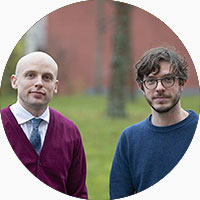
Today, in light of climate change and shifting consumer demands, many companies portray their operations as the better choice for the environment. Such green promises have the potential to influence the choices of consumers and the business practices of commercial actors, thereby stimulating (less un)sustainable consumption and contributing to climate transition – but only if they are trusted. Widespread greenwashing instead leads to consumer skepticism, with the opposite results. That is the background for our interdisciplinary work, which examines green marketing communication through a combination of legal and rhetorical perspectives.
In this seminar, we will present our recent book The Virtues of Green Marketing: A Constructive take on Corporate Rhetoric (Palgrave 2023), where, instead of focusing on the negative examples, we envisage what virtuous green marketers should strive for. More specifically, we present a theoretical framework for virtue-oriented discussions of green marketing. The framework provides analytical tools for qualitative analysis of green marketing. It not only highlights the importance of communicative virtues such as transparency, balanced disclosure of relevant aspects, and the use of relevant authorities. It also considers the multiple effects of commercial rhetoric, including its capacity to shape values and self-understanding.
The book is openly accessible at: https://link.springer.com/book/10.1007/978-3-031-32979-1
Bio
Erik Bengtson (PhD in rhetoric 2019) is researcher at the Department of literature and rhetoric, UU and senior lecturer at Södertörn University. Beyond the field of environmental communication, he has contributed to the methodology of rhetorical argumentation analysis, incorporating concepts from semiotics, rhetorical epistemology, and theories of myth.
Oskar Mossberg (LL D in private law 2020) is researcher at the Law department, UU. He is deeply invested in interdisciplinary work and legal methodology. His home field is contract law, where his work has a particular focus on problems related to third party effects and other effects on the fringes of contractual regimes, including not least the kind of vague statements often prevalent in green marketing. A main theme in his current research is how to make green promises matter, as a matter of law.
Bengtson and Mossberg have worked together for four years, inquiring into the dynamics between corporate sustainability rhetoric and the regulatory system. They explore venues for fostering sustainable development, and implementing sustainability aspects within the private law framework.
May 16 kl. 12.00-13.00
Cecilia Åsberg Environmental humanities as posthumanities
Moderated by Sofia Oreland, Department of Theology
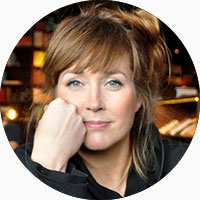
Bio
Cecilia Åsberg is Professor and chair of Gender, Nature, Culture at Linköping University, Sweden, doing more-than-gender Gender Studies across the divides of art, science, and everyday society. Since 2008, she is the founder and director of The Posthumanities Hub (www.posthumanitieshub.net) – a collaboratory for bringing art and science to the humanities, and transformative insight to society by webinars, workshops, creative projects and research schools. The Posthumanities Hub is a multi-university research group amidst the ecologies, biologies and technologies of the now, specialising in more-than-human humanities and arts of living on a damaged planet. Internationally recognized in feminist STS, environmental humanities and posthumanities in practice, Cecilia Åsberg has held professorships at Utrecht University (NL, 2005-2008), KTH Royal institute of Technology in Stockholm (2018-2021) and e.g. Rachel Carson Centre at Ludvig Maximilian University in Munich and Oslo Met University, NO. She inaugurated the Swedish environmental humanities research programme at LiU, the Seed Box 2013-2017 as programme director, and she has published extensively over the years.
Read more: https://liu.se/en/employee/cecas20
Autumn semester 2023
Welcome to a three part lunch seminar series on the Environmental and Climate Humanities this autumn 2023, starting September 21!
A collaboration between CEMUS, Centre for Environment and Development Studies, Uppsala University and SLU, CRS, Centre for Multidisciplinary Research on Religion and Society, Uppsala University, and Sofia Oreland, Department of Theology, Uppsala University.
Where: September 21: room 22-1009, see map here: https://link.mazemap.com/Vu1lHj8I October 26 and November 16: 22-0031, see map here: https://link.mazemap.com/k1hn0pOx (same entrance as Humanistiska teatern)
September 21 online:
https://uu-se.zoom.us/j/63449623731
October 26 online:
https://uu-se.zoom.us/j/61956622459
November 16 online:
https://uu-se.zoom.us/j/68717971940
How: We open the doors at 12.00 for mingle and bring your own lunch, the seminar starts 12.15 with a presentation by the invited speaker followed by discussion 12.45, and we end 13.00 sharp.
September 21 kl. 12.00-13.00
Thomas Höjemo Step by step to a transport transition: elevating environments for wellbeing via walking
Moderated by Martha Middlemiss Lé Mon, CRS
https://uu-se.zoom.us/j/63449623731
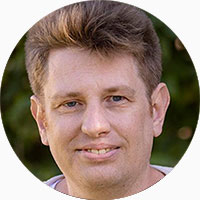
When reshaping mobility to align with climate goals, the most foundational of all transport modes – walking – is often forgotten. Yet moving by foot brings broad benefits for both environment and health. This tenet underlines the research study presented, detailing how inhabitants of the west-coast town Varberg experienced walking in an urban setting and how these experiences affected their willingness to walk. Their stories provided the foundation for producing practical recommendations on tailoring towns to enhance the environmental affordances for wellbeing in walking.
Bio
Thomas Höjemo is a postdoctoral researcher at the Institute for Housing and Urban Research at Uppsala University, with a doctorate in Architecture. His research focuses on how urban residential environments can be designed to facilitate dwellers’ choices of mobility modes with less environmental impact.
Read more: https://www.katalog.uu.se/profile/?id=N21-1675
This seminar is cancelled
October 26 kl. 12.00-13.00
Hans Olsson ‘Farming God’s Way’? Articulations of biblical farming in South Africa
Moderated by Sofia Oreland, Department of Theology
https://uu-se.zoom.us/j/61956622459
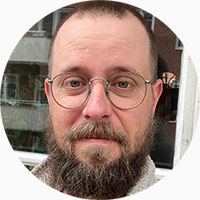
With growing attention placed on Pentecostal-Charismatic Christians’ public role, the globally growing strand of churches’ relationship to the environment remain largely understudied. This presentation will zoom in on the growing public presence of Pentecostal-Charismatic and Evangelical Christianity, and address how cultivating food ‘God’s way’ takes form and interplay with discourses of poly-crisis in South Africa. Using ethnographic methods, biblically authorised land practices are analysed as taking place between emotional attachments and public discourse. I will argue for understanding farming as a space of both mediating human-nature relations as well as contestation in relation to what land is for and how it should be used.
Bio
Hans Olsson (PhD Lund University 2017) is currently a guest researcher at the Centre of African Studies at the University of Copenhagen, where he between 2019-2023, held a Marie Curie Fellowship, running a project on Evangelical Charismatic Christian farming, cultivation and sustainability in South Africa (see more FarGo). He is an affiliated researcher at the Department of Anthropology, Rhodes University, and has earlier written on Pentecostal-Muslim encounters in the context of Zanzibar and Tanzania.
This seminar is cancelled
November 16 kl. 12.00-13.00
Patrik Cras and Ulrika Persson-Fischier Title coming
https://uu-se.zoom.us/j/68717971940
Description coming.
Bio
Coming.
Spring semester 2023
Welcome to a three part lunch seminar series on the Environmental and Climate Humanities this spring 2023, starting February 9!
A collaboration between CEMUS, Centre for Environment and Development Studies, Uppsala University and SLU, CRS, Centre for Multidisciplinary Research on Religion and Society, Uppsala University, and Sofia Oreland, Department of Theology, Uppsala University.
Where: February 9 and March 30: room 22-1009, see map here: https://link.mazemap.com/Vu1lHj8I March 16: 22-0031, see map here: https://link.mazemap.com/k1hn0pOx (same entrance as Humanistiska teatern)
February 9 online:
https://uu-se.zoom.us/j/64045889808
March 16 online:
https://uu-se.zoom.us/j/67871647541
March 30 online:
https://uu-se.zoom.us/j/68698681151
How: We open the doors at 12.00 for mingle and bring your own lunch, the seminar starts 12.15 with a presentation by the invited speaker followed by discussion 12.45, and we end 13.00 sharp.
February 9 kl. 12.00-13.00
Johan Gärdebo Transition Technocracy and Populism: Reception of climate policies in Europe (in general) and among Swedish industrial workers (in particular)
Moderated by Daniel Mossberg, CEMUS
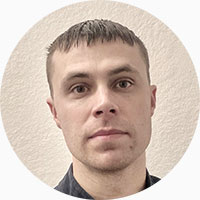
Since the Paris Agreement 2015, “just transition” have central to attempts, and hopes, to bridge a jobs. vs. climate-divide as part of decarbonising industrial society. But what are the imperatives for a just transition of the workforce? And what are the nationally defined development priorities for the creation of decent work and quality jobs? Through interviews with Swedish trade union representatives from Sweden’s three largest industrial emitters (steel, petroleum refining, cement) along with representatives at the central level, this study illustrates contrasting interpretations of what constitutes a just transition.
The main tensions concern the time a climate transition is allowed to take; if policies should support local inhabitants or global concerns over climate change. These matters have become increasingly critical given the many revolts by industrial workers, transport personnel, and farmers, across Europe. In this presentation, Gärdebo describe some of the differing receptions to climate transition policies based on case studies among Swedish workers. The larger aim of the presentation is to situate receptions of climate policies in a larger discussion about attempts to govern Western societies technocratically.
Bio
Johan Gärdebo is a historian studying climate knowledge and decarbonisation policies as these interplay in local, national, and transnational settings. He is currently conducting research projects detailing Sweden’s historical contributions to climate knowledge during the 1900s, as well as conflicts surrounding contemporary climate transitions policies, focusing in particular on industrial towns and previous industrial transitions.
Read more: https://www.katalog.uu.se/profile/?id=N21-2415
March 16 kl. 12.00-13.00
Lauren Strumos Nonreligion and climate change through a lens of justice
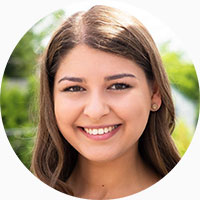 Moderated by Martha Middlemiss Lé Mon, CRS
Moderated by Martha Middlemiss Lé Mon, CRS
In traditionally Christian countries like Canada the number of people who do not identify as religious in increasing. At the same time, there is a growing awareness of anthropogenic climate change and ecological destruction. This seminar will present climate justice as a framework to better understand intersections between nonreligion and ecology. How do the nonreligious conceptualize their place in a world experiencing planetary crisis? What are the various ways they construct moral relationships with other terrestrials, human and non-human? Empirical data for this seminar is drawn from interviews conducted with settler activists, both nonreligious and religious, opposed to an oil pipeline project in British Columbia, Canada.
Bio
Lauren Strumos is a doctoral candidate in Religious Studies at the University of Ottawa (Canada). Her research explores how settler activists conceptualize their opposition to an oil pipeline project in the province of British Columbia, Canada. Her other research interests include veganism and human/non-human animal relations. Lauren is a deputy editor of Nonreligion and Secularity, the blog of the Nonreligion and Secularity Research Network, and she was an Ian H. Stewart Graduate Fellow (2021–2022) at the Centre for Studies in Religion and Society at the University of Victoria (Canada). Lauren received a Mitacs Globalink Research Award to visit the Centre for Multidisciplinary Research on Religion and Society at Uppsala University from January to April 2023.
March 30 kl. 12.00-13.00
Panu Pihkala The process and variety of climate emotions
Moderated by Sofia Oreland, Department of Theology
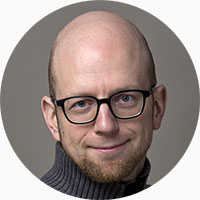 Experienced eco-emotion researcher and “eco-theologian” Panu Pihkala from University of Helsinki will discuss important climate emotions and ways of encountering them constructively. The major framework is his recent research article “The Process of Eco-Anxiety and Ecological Grief”, freely available at https://www.mdpi.com/2071-1050/14/24/16628. What is commonly called “climate anxiety” consists of many things, including various grief reactions, but fundamentally it is an adaptive response in the sense of being in touch with the reality of the climate crisis. The wide range of possible climate emotions is discussed in Pihkala’s other research article from last year, Toward a Taxonomy of Climate Emotions, https://www.frontiersin.org/articles/10.3389/fclim.2021.738154/full.
Experienced eco-emotion researcher and “eco-theologian” Panu Pihkala from University of Helsinki will discuss important climate emotions and ways of encountering them constructively. The major framework is his recent research article “The Process of Eco-Anxiety and Ecological Grief”, freely available at https://www.mdpi.com/2071-1050/14/24/16628. What is commonly called “climate anxiety” consists of many things, including various grief reactions, but fundamentally it is an adaptive response in the sense of being in touch with the reality of the climate crisis. The wide range of possible climate emotions is discussed in Pihkala’s other research article from last year, Toward a Taxonomy of Climate Emotions, https://www.frontiersin.org/articles/10.3389/fclim.2021.738154/full.
Bio
Dr. Panu Pihkala (b. 1979, he/his) is an adjunct professor of environmental theology (Title of Docent) at the University of Helsinki and a researcher in HELSUS Sustainability Science Institute. He is currently known as a leading expert in interdisciplinary eco-anxiety research. Pihkala has published two books about eco-emotions in Finnish, along with many books about eco-theology. Publications: https://scholar.google.com/citations?user=wwPxvoMAAAAJ&hl=en
Read more: https://www.helsinki.fi/en/about-us/people/people-finder/panu-pihkala-9125989
Autumn semester 2022
Welcome to a three part lunch seminar series on the Environmental and Climate Humanities this autumn 2022, starting September 15!
A collaboration between CEMUS, Centre for Environment and Development Studies, Uppsala University and SLU, CRS, Centre for Multidisciplinary Research on Religion and Society, Uppsala University, and Sofia Oreland, Department of Theology, Uppsala University.
When: September 15, October 13, November 10 kl. 12.00-13.00
Where: room 22-0031 (same entrance as Humanistiska teatern), see map here: https://link.mazemap.com/k1hn0pOx
Sep 15 Online/Zoom: https://uu-se.zoom.us/j/69011525678
Oct 13 Online/Zoom: https://uu-se.zoom.us/j/65781262334
Nov 10 Online/Zoom: https://uu-se.zoom.us/j/62584772324
How: We open the doors at 12.00 for mingle and bring your own lunch, the seminar starts 12.15 with a presentation by the invited speaker followed by discussion 12.45, and we end 13.00 sharp.
September 15 kl. 12.00-13.00
Sofia Oreland Future narratives of opportunities in times of climate crisis
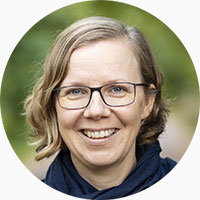 Moderated by Malin Östman, CEMUS
Moderated by Malin Östman, CEMUS
In an era of climate crises, threat-based narratives on the future tend to dominate. Narratives of opportunities on how to create sustainable societies are not equally present, yet important in the strive to find alternative ways forward. At the seminar, I will present narratives of opportunities on the future formulated by faith-based climate activists in Sweden and South Africa.
The study is based upon interviews with faith-based activists and participant observations at faith-based events. One of these events was “The Pilgrims walk for future”, during which a group of pilgrims walked from Sweden to the UN climate negotiations in Glasgow November 2021. The walk was a combination of a political manifestation and a pilgrimage in which prayerful contemplation was central. I found that they, in addition to ideas similar to the ones suggested by secular transition movements, raised opportunities closely linked to their religious faith and spirituality and/or to their experience of participating in this very pilgrimage.
Bio
Sofia Oreland is a doctoral student in Global Christianity at the Uppsala University in Sweden, currently working on her PhD-project about Christian climate activists’ religious faith and spirituality expressed in their climate advocacy work. The project is an intercultural theological study of religious faith expressed by climate activists in Sweden and South Africa. Her research interests are to be found in the intersection between the theology of culture and environmental thought, as well as in public theology.
Read more: https://katalog.uu.se/empinfo/?id=N20-1461
October 13 kl. 12.00-13.00
Seth Epstein Human Species Identity in the Anthropocene: A role for rights of nature?
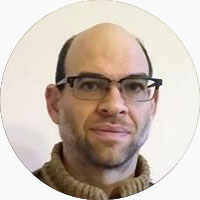 Moderated by Martha Middlemiss Lé Mon, CRS
Moderated by Martha Middlemiss Lé Mon, CRS
Bio
I am a historian focusing on the U.S. in the 20th century and a researcher at the Centre for Multidisciplinary Research on Religion and Society at Uppsala University. I am currently the lead investigator for a project based at CRS titled Realizing Rights of Nature: Sustaining Development and Democracy, which examines issues relevant to the UN’s global sustainable development goals identified in Agenda 2030. This project focuses on the actions of a growing number of jurisdictions over the past decade and a half to grant rights to nature. It further explores the potential challenges, politics, and resistance to conceiving and implementing such Rights of Nature (RoN) initiatives by placing them within the longer history of the expansion of rights and the creation of new legal subjects. The project has thus far produced two articles and our goal is to develop a handbook of primary and secondary sources about the relations between rights of nature and democracy. My previous research topics have included religious tolerance in the Jim Crow U.S. South, the employment of African Americans in the U.S. state of North Carolina between 1925 and 1950, and taxicab regulation in the 1920s and 1930s.
Read more: https://www.crs.uu.se/research/ongoing-research/realizing-rights-of-nature/
November 10 kl. 12.00-13.00
Frida Buhre Temporal Othering and Sami Decolonial Struggles: The Case of the Early 20th Century Swedish Press
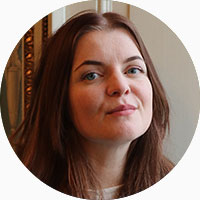 Moderated by Sofia Oreland, Department of Theology
Moderated by Sofia Oreland, Department of Theology
Bio
Frida Buhre is a postdoctoral researcher at Linköping University working in Environmental humanities and communication. With a background in rhetoric, she does work on Sami mobilization, children and youth climate justice activism, critical time studies, and political aesthetics.
Read more: https://katalog.uu.se/empinfo/?id=N10-1161
Spring semester 2022
February 3 kl. 12.00-13.00
David Thurfjell Secularity and Nature Romanticism in Sweden
Moderated by Martha Middlemiss Lé Mon, CRS
 I am a professor in the study of Religions at Södertörn University in Stockholm, Sweden. I received my doctoral degree in History of Religions from Uppsala University (2003) and have since published widely within the fields of Islamic and Romani studies. My academic interests include secularization and religious change, religion among Romani people, Iranian and Shi´ite studies, Pentecostal studies, ritual and postcolonial theory.
I am a professor in the study of Religions at Södertörn University in Stockholm, Sweden. I received my doctoral degree in History of Religions from Uppsala University (2003) and have since published widely within the fields of Islamic and Romani studies. My academic interests include secularization and religious change, religion among Romani people, Iranian and Shi´ite studies, Pentecostal studies, ritual and postcolonial theory.
I am the author of the monographs Living Shi´ism (Brill 2006), Faith and revivalism in a Nordic Romani Community (I.B. Tauris 2013) and The godless people: the post-Christian swedes and religion (Molin & Sorgenfrei 2015). I have a wide interest for international scholarly collaborations, particularly with Middle Eastern countries. Together with a group of Arab scholars I co-authored the UNESCO guidebook for history textbook authors writing on Europe and the Arabo-Islamic world (UNESCO/ISESCO 2011). I am a board member of the Swedish research institute in Istanbul and in 2015 I organized a symposium about religion and jurisprudence bringing together scholars from Europe and Iraq. I am also the sitting president of the Swedish association for the history of religions (SSRF).
Read more: https://www.sh.se/kontakt/forskare/david-thurfjell
March 10 kl. 12.00-13.00
Sofia Ahlberg Poetry for a “Beaten Heart”
Moderated by Malin Östman, CEMUS
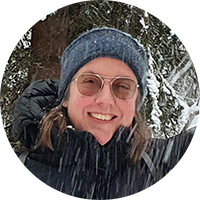 I am the Vice Dean of the Faculty of Languages at Uppsala University, Sweden, with responsibility for education and collaboration, and Associate Professor in Literature and Pedagogy at the Department of English, also at Uppsala University. I teach and research on contemporary literature, pedagogy, and ecocriticism.
I am the Vice Dean of the Faculty of Languages at Uppsala University, Sweden, with responsibility for education and collaboration, and Associate Professor in Literature and Pedagogy at the Department of English, also at Uppsala University. I teach and research on contemporary literature, pedagogy, and ecocriticism.
My most recent book Teaching Literature in Times of Crisis (Routledge, 2021) has just been published. My other publications include another monograph Atlantic Afterlives in Contemporary Fiction (Palgrave, 2016) as well as numerous chapters and articles in edited collections and journals, most recently in The Handbook of Twentieth and Twenty-First Century Literature and Science (Palgrave, 2020) and Teaching the Literature of Climate Change (MLA, forthcoming). I contributed to a highly original edited collection called Loanwords to Live With: An Ecotopian Lexicon (Minnesota UP, 2019) and my essay on the Swedish word “fotminne” can be read about in “Parlör for ett vettigare sätt att tala om klimatet” (SvD, 2020) as well as in “The Search for New Words to Make us Care about the Climate Crisis” in The New Yorker, 2020.
Read more: https://katalog.uu.se/profile/?id=N16-2241
April 7 kl. 12.00-13.00
Petra Carlsson Nonhuman Histories of Theology
Moderated by Sofia Oreland, Department of Theology
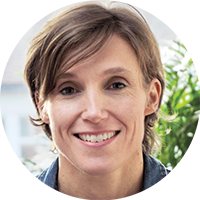 I am a scholar of Systematic theology, Dean of the Department of Religious Studies and Theology, Senior lecturer, University College Stockholm, and a minister of the Lutheran Church of Sweden. My research interests include continental philosophy, art, political theology and political and artistic activism.
I am a scholar of Systematic theology, Dean of the Department of Religious Studies and Theology, Senior lecturer, University College Stockholm, and a minister of the Lutheran Church of Sweden. My research interests include continental philosophy, art, political theology and political and artistic activism.
My publications includes two books Foucault, art, and radical theology: the mystery of things (Routledge, 2019) and <Mysticism as revolt: Foucault, Deleuze, and theology beyond representation (Davies Group, Publishers, 2014).
Read more: https://ehs.se/personer/petra-carlsson/


